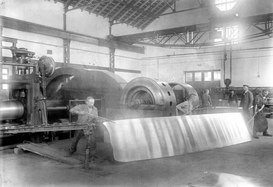Swissmetal
| Swissmetal Industries AG
|
|
|---|---|
| legal form | Corporation |
| Seat |
Reconvilier BE Switzerland |
| management | Claudio Penna ( CEO ) |
| Number of employees | 250 |
| sales | 45,000,000 CHF |
| Branch | Metal processing |
| Website | https://swissmetal.com/ |
The Swissmetal Industries AG is an internationally active Swiss industrial company that specializes in the development, manufacture and marketing of specialty products made of copper and copper alloys specializes. Until the end of 2012, the company was based in Dornach in Solothurn and has been in Reconvilier in Bern since the beginning of 2013 . From 2013 to mid-2019 the company was called Baoshida Swissmetal AG a subsidiary of the Chinese Baoshida Holding Group Co. Ltd.
Field of activity
The products made of copper and copper alloys are mainly used in the electronics, telecommunications, aviation, petroleum, automotive, stationery and watch industries as well as in the architectural sector. The two production sites are in Switzerland, in Dornach in Solothurn and in Reconvilier in the Bernese Jura .
history
The company has its origins in three company foundations in the second half of the 19th century at the Thun, Reconvilier and Dornach locations due to the growing demand for non-ferrous metal products, especially for the manufacture of clockworks, ammunition and telephone wire. In 1855 Edouard Boillat founded the company Bueche, Boillat et Cie with his father-in-law in Reconvilier . , the first brass smelter in Switzerland and a supplier to the watch industry. Metallwerke AG was founded in Dornach in 1895 . In the same year the industrialist Gustav Selve founded the Schweizerische Metallwerke Selve & Co. in Thun , to which a location in Uetendorf was to be added in 1953.
At the beginning of the 20th century, the rolling mills were supplemented by pressing and drawing mills and also used them to manufacture brass rods and later wires for turning shops. In the early 20th century, the plants began to buy extrusion presses and set up drawing mills, with the rolling mills and foundries also expanding again and again.
Up until the 1980s, the three non-ferrous metal manufacturers Bueche, Boillat et Cie., Metallwerke AG and Schweizerische Metallwerke Selve & Co. were leaders in various non-ferrous metal markets. Then the three companies were merged in 1986 in the newly founded UMS Schweizerische Metallwerke AG due to increasing competitive pressure . In 1990 UMS Schweizerische Metallwerke AG bought the German Busch-Jaeger Metallwerke GmbH in Lüdenscheid, which specializes in pressed and drawn products of smaller dimensions . At that time the company had over 2000 employees.
The continuing loss of market shares due to insufficient competitiveness in various non-ferrous metal commodity areas led to the closure of the Selve plants in Thun and Uetendorf in 1991 soon after the merger. At the end of 2002, the Busch-Jaeger plant went into the aftermath of the global economic crisis at the time Insolvency.
As a result, all banks of UMS Schweizerische Metallwerke AG canceled the credit lines and the entire group was on the verge of being canceled for the first time. A far-reaching restructuring program was developed and decided by the Ally Management Group restructuring specialist Martin Hellweg. This program enabled the company to gain a second life on the capital market through extensive refinancing in June 2004.
A central part of the restructuring program was the integration of the two remaining plants in Reconvilier and Dornach and the merging of the foundry and extrusion press facilities at the Dornach site. In protest against the integration and relocation of various plants from Reconvilier, two illegal strikes took place there, which were highly regarded throughout Switzerland, once in autumn 2004 for 10 days and once in February 2006 for 30 days. The renewed merger with Busch-Jaeger Metallwerk GmbH in Lüdenscheid, which was restructured by a group of investors following the bankruptcy, then gave the decisive impetus to settle the second strike at the beginning of March 2006. In 2007 and 2008, the last steps were taken as part of the 2003 restructuring program . The renovator Martin Hellweg left the company in May 2009.
However, the global economic crisis of 2009/2010 and the CHF-EURO exchange rate, which has since become detrimental to Swiss production sites, hit the company very hard again. On June 30, 2011, the general assembly of Swissmetal elected a new board of directors consisting of the three Ally Management Group partners Martin Hellweg, Patrick Huber-Flotho and Arturo Giovanoli. The management was terminated by the previous board of directors on the same day.
Shortly afterwards, in August 2011, another far-reaching restructuring followed as part of an estate procedure. The company found operational ground once more and was given a third chance of survival for the remaining 450 employees. In November 2012, the German plant in Lüdenscheid was sold to the French Le Bronze Industriel SAS. In January 2013, what was then Baoshida Swissmetal AG took over the Swiss operations in Dornach and Reconvilier with all current employees and secured the “Swissmetal” brand, among other things. This means that the continued existence of this traditional name and the continued operation of the associated operations, focusing on specialty products that can be produced in Switzerland, can be regarded as secured for the time being.
Historical review: aluminum rolling mill in Thun, 1914–1918
Web links
- Christophe Koller: Boillat, Edouard. In: Historical Lexicon of Switzerland .
- Swissmetal is back in Swiss hands. In: bazonline.ch . Retrieved August 6, 2019 .







